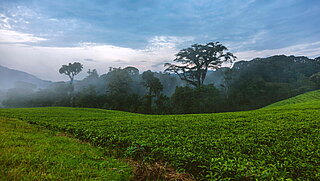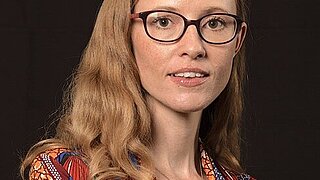Rwanda - linking green growth and climate resilience

Interview with Louise Brown, advisor under the Economic Advisory Initiative
In June 2020, the government of Rwanda requested support through the NDC Partnership´s Economic Advisory Initiative to advance the country’s green recovery. In this interview, Louise Brown talks about her work as an economic advisor in the East African country.
What are the most urgent challenges in Rwanda and what are the government's priorities for a green economic recovery?
The government of Rwanda has been proactive in pursuing climate resilient green growth. Its Vision 2050 sets a goal to become a climate neutral, prosperous, high-income country by 2050.
The "Green Growth and Climate Resilience Strategy", which was adopted in 2011 and is currently being updated, aims to provide a pathway towards achieving this goal. Rwanda was the first African country to submit its revised Nationally Determined Contribution (NDC) under the Paris Agreement. However, it is a low-income country with a population primarily dependent on agriculture, and highly vulnerable to climate change impacts. The COVID-19 pandemic and associated global lockdown have had a devastating impact on Rwanda’s economy and people, bringing tourism to a sudden halt, affecting supply chains and exports in the landlocked country, slowing the implementation of a wide range of development projects, and leaving vulnerable populations even more marginalized.
The government’s priority in the face of this crisis has been to ensure a social safety net for the most vulnerable households, including those who have lost their source of income. In addition, the aim is to keep businesses solvent in order to maintain jobs. Overall, the target was to create the conditions for a quick recovery once the international economy reopens so that the country can get back on track to achieve its medium and long-term development goals.
How important is the green recovery approach for the Rwandan government?
Green economic recovery is a crucial part of the economic recovery and growth agenda for Rwanda, as the country has a comparative advantage in low-carbon, climate resilient sectors, already has a clear policy framework to advance green growth.
So far, you have been supporting the Ministry of Finance and Economic Planning since March 2021. What is your role and what does your day-to-day work entail?
My role as a climate change economic advisor is to support the government of Rwanda to strengthen the alignment between its climate change ambition and its planning for economic recovery and economic growth, as well as to support resource mobilization for green economic recovery and growth.
This involves conducting an assessment of the areas in which the alignment could be improved, making recommendations of policy, institutional, coordination and financial actions to enhance green economic recovery and growth, identifying opportunities for resource mobilization from a range of public and private sector sources, supporting the development of projects and developing training materials.
In this assignment, I work closely with the Ministry of Finance and Economic Planning and the Ministry of Environment, and I consult a wide range of stakeholders including government agencies, private and financial sector actors, civil society actors and development partners.
What has your experience been so far in your advisory work in Rwanda?
There is a strong political will in Rwanda for advancing climate resilient, green growth and for integrating climate change considerations into development across all sectors, at national and local level. In addition, there is a strategic and well-coordinated approach to development planning, and strong government systems for accountability, which set Rwanda in good stead for ensuring the successful implementation of green economic recovery measures. A number of challenges remain, including limited capacity and limited financing to implement all priority activities in the intended timeframe, as well as an over-reliance on donor funding and external technical assistance. However, these are gradually being addressed through strategic investment in national institutions, systems and capacities and broadening the resource base.
What lessons learned could you pass on to practitioners who want to make green recovery a reality?
Green economic recovery requires an economy-wide approach, engaging all sectors and all levels of economic activity, from international (e.g. trade and investor engagement) to national (e.g. development planning and budgeting processes) to local (e.g. district level planning and local land use).
It ideally needs to be driven by finance ministries who have the political and financial influence to compel action across all sectors, in close collaboration with environment ministries and other sector ministries who have the technical expertise to design climate change mitigation and adaptation actions.
It is a process that requires buy-in and commitment from all stakeholders including government agencies, private sector, civil society, development partners, and communities and households. Securing this buy-in requires government to ensure a clear policy orientation and strategic target-setting, good communication, appropriate incentives for private sector action, and strong, stable institutions.
Louise, thank you very much for the interview and the insights into your work in Rwanda!
The link has been copied to the clipboard
Contact
IKI Office
Zukunft – Umwelt – Gesellschaft (ZUG) gGmbH
Stresemannstraße 69-71
10963 Berlin
Interview partner

Louise Brown works under the Economic Advisory Initiative as part of the IKI project Policy dialogue and knowledge management on low emissions development. She is an environmental economist by training and has worked in the field of climate finance for the last 12 years.
“Green economic recovery requires an economy-wide approach, engaging all sectors and all levels of economic activity.”
Economic Advisory Initiative
By financing economic advisors, IKI is providing support to its partner countries during the coronavirus crisis as they work to combine economic recovery goals with climate and biodiversity targets.



